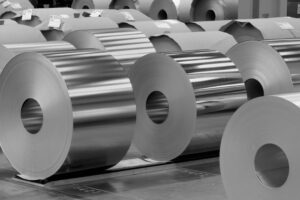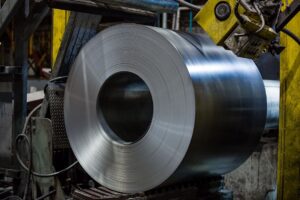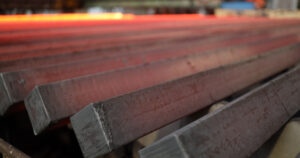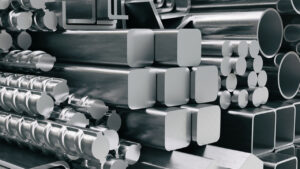
In July 2025, global steel production amounted to 150.126 million tons, which is 1.3% less than in July 2024.
According to the World Steel Association (Worldsteel), the top ten countries are as follows:
China — 79.660 million tons (-4% y/y)
India — 14.000 million tons (+14%)
United States — 7.142 million tons (+4.8%)
Japan — 6.918 million tons (-2.5%)
Russia — 5.700 million tons (-2.4%)
South Korea — 5.256 million tons (-4.7%)
Turkey — 3.182 million tons (+4.2%)
Brazil — 2.930 million tons (-5.5%)
Germany — 2.719 million tons (-13.7%)
Iran — 2.235 million tons (+29.7%)

Metinvest, Ukraine’s largest mining and metallurgical holding, reduced steel production by 13% year-on-year to 908,000 tons in January-June 2025, according to its operating results for the period.
According to a press release from the parent company Metinvest B.V. on the results of its operating activities for Q2 2025, total iron ore production for this period also decreased by 13% compared to January-June 2024, to 7.725 million tons.
At the same time, the production of marketable iron ore concentrate (MIOC) decreased by 8% compared to the first half of 2024, to 7.528 million tons. Together with the total production of MIOC in the first half of 2025, it decreased by 13%, to 7.725 million tons.
It is noted that coke production in January-June 2025 decreased by 5% compared to the first half of 2024, to 5%, to 535 thousand tons.
At the same time, it is specified that in the second quarter of 2025, pig iron and steel production at the Kame-Stal Metallurgical Plant decreased by 19% and 14%, respectively, compared to the previous quarter and the first quarter of 2025, to 353 thousand tons and 420 thousand tons, due to the shutdown of blast furnace No. 9 for major repairs in April-June 2025. In the first half of 2025, pig iron production amounted to 789 thousand tons, which is 11% less than in the same period last year, due to the aforementioned overhaul of furnace No. 9 at Kametstal and a temporary technological shutdown at the pulverized coal fuel (PCF) site in March 2025. This led to a decrease in steel production to 908 thousand tons, or 13% less than in the corresponding period of the previous year.
Against the backdrop of a decline in pig iron production and an increase in domestic consumption of billets at subsequent stages of production, the output of semi-finished products decreased in the second quarter of 2025 by 26% compared to the previous quarter, to 128 thousand tons; in the first half of 2025, by 20% compared to the same period last year, to 301 thousand tons.
In the second quarter of 2025, finished product output increased by 5% compared to the previous quarter and amounted to 628 thousand tons. In particular: flat steel production increased by 11% to 289,000 tons, mainly due to growth in orders for hot-rolled coils at Ferriera Valsider (Italy).
Long product production remained almost at the previous quarter’s level and amounted to 339,000 tons, with output at Kametstal increasing by 4%.
In the first half of 2025, finished product production increased by 3% compared to the same period in 2024. In particular, long product production increased by 5% thanks to higher volumes at Kametstal, while flat product production remained almost unchanged from the previous period.
In the second quarter of 2025, coke production increased by 6% compared to the previous quarter, to 275,000 tons, mainly due to the emergency shutdown of Zaporizhkox in February due to military operations. In the first half of 2025, coke production decreased by 5% to 535,000 tons compared to the same period last year due to the decommissioning of coke oven battery No. 1 at Kametstal.
In the second quarter of 2025, the production of total iron ore concentrate and marketable iron ore products remained almost at the level of the previous quarter and amounted to 3.910 million tons and 3.767 million tons, respectively. At the same time, due to the shutdown of the roasting machine at the Central GOK for major repairs in May 2025, iron ore concentrate production increased by 5% to 2.175 million tons, while the output of pellets decreased by 6% to 1.592 million tons.
In the first half of 2025, total iron ore concentrate production decreased by 13% compared to the same period last year due to the shutdown of the Ingulets GOK in July 2024. This was partially offset by an increase in volumes at the Northern GOK – by 47% due to increased production at the Hannivskyi open pit, as well as at the Central GOK – by 22% due to increased iron ore supplies from third parties. At the same time, the production of marketable iron ore products decreased by 8%, including concentrate by 16%, while the output of marketable pellets increased by 3%.
In December 2024, due to the intensification of hostilities and the approach of the front line, the production site of the Pokrovsk Coal Group was suspended. Subsequently, against the backdrop of power outages and a further deterioration in the security situation, production at the mine and enrichment plant was suspended.
As a result, starting in 2025, coal concentrate production has been concentrated exclusively at United Coal Company (USA). In the second quarter of 2025, coal concentrate production fell to 518,000 tons, down 10% from the previous quarter, due to the deterioration in the quality of coking coal.
In the first half of 2025, coal concentrate production decreased by 53% to 984,000 tons due to the shutdown of the Pokrovsk Coal Group.
As reported, Metinvest increased steel production by 4% in January-March this year compared to the same period last year, but decreased by 1% compared to the previous quarter, to 488,000 tons. Total iron ore production for this period decreased by 15% compared to January-March 2024, but increased by 11% compared to the previous quarter, to 3.761 million tons.
At the same time, the production of commercial iron ore concentrate (CIO) decreased by 27% compared to Q1-2024 and increased by 7% compared to the previous quarter, reaching 2.064 million tons. Total production of IRC in Q1 2025 decreased by 21% compared to Q1 2024 and increased by 17% compared to the previous quarter, reaching 3.815 million tons.
At the same time, Metinvest increased its production of pellets by 7% compared to Q1 2024 and by 9% compared to Q4 2024, to 1.697 million tons. but reduced its total output of coking coal concentrate by 52% in Q1 2024 and by 51% compared to the previous quarter, to 518 thousand tons. Coke output in January-March 2025 decreased by 8% compared to Q1 2024 and by 6% compared to Q4 2024, to 260 thousand tons.
As reported, Metinvest increased steel production by 4% in 2024 compared to 2024, to 2.099 million tons, while total iron ore production increased by 42%, to 15.733 million tons. At the same time, commercial iron ore concentrate production increased by 58% to 14.826 million tons. Coke output in 2024 decreased by 10% to 1.122 million tons. At the same time, Metinvest increased its total production of pellets by 14% to 6.022 million tons, but reduced its total output of coking coal concentrate by 22% to 4.277 million tons.
Metinvest is a vertically integrated group of mining and metallurgical enterprises. Its enterprises are located in Ukraine, in the Donetsk, Luhansk, Zaporizhia, and Dnipropetrovsk regions, as well as in the European Union, the United Kingdom, and the United States.
The main shareholders of the holding company are the SCM Group (71.24%) and Smart Holding (23.76%). Metinvest Holding LLC is the managing company of the Metinvest Group.

In January-May this year, Ukraine reduced exports of semi-finished carbon steel products in physical terms by 34.1% year-on-year to 506,071 thousand tons.
According to statistics released by the State Customs Service (SCS) on Friday, exports of carbon steel semi-finished products fell by 34.7% to $248.953 million in monetary terms.
The main exports were mainly to Bulgaria (40.43% of supplies in monetary terms), Turkey (15.96%) and Poland (15.07%).
During the period, Ukraine imported 3,303 thousand tons of semi-finished products worth $2.687 million, mainly from the Czech Republic (72.47%), Italy (26.26%) and Romania (0.93%).
As reported, in 2024, Ukraine increased exports of carbon steel semi-finished products in physical terms by 56.7% compared to 2023 – up to 1 million 886.090 thousand tons, while revenue in monetary terms increased by 52.4% to $927.554 million. The main exports were made to Bulgaria (32.06% of supplies in monetary terms), Egypt (18.50%) and Turkey (11.14%).
In 2024, Ukraine imported 306 tons of semi-finished products worth $278 thousand from the Czech Republic (88.13%), Romania (7.19%), and Poland (2.88%), while in 2023 it imported 96 tons worth $172 thousand.

In 2024, Ukraine increased its apparent steel use by 5.9% compared to 2023, from 3.4 million tons to 3.6 million tons. Per capita consumption was 95 kg (compared to 93.4 kg in 2023). This is significantly lower than the global average of 214.7 kg per capita.
According to Worldsteel, Ukraine produced 7.6 million tons of steel in 2024 (6.2 million tons in 2023), ranking 22nd in the world. Despite the growth, Ukrainian companies did not make it into the list of the world’s 50 largest steel producers, whereas in 2014–2021, the Metinvest Group was present in it.
The world leaders in steel production in 2024 remained China Baowu Group (130.09 million tons), ArcelorMittal (65 million tons), Ansteel Group (59.55 million tons), Nippon Steel (43.64 million tons), and HBIS Group (42.28 million tons).